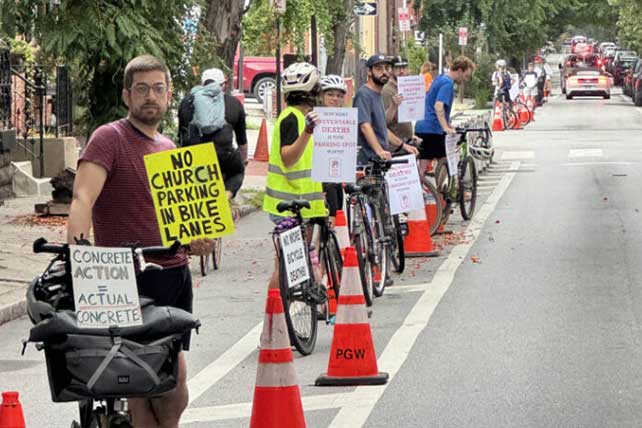(RNS) — If all goes well, worshippers at Tenth Presbyterian Church in Philadelphia will be able to park on the streets near the church in peace.
They just may have to walk a little bit farther to do so.
Earlier this week, after months of protest by Philly Bike Action, a local association of cyclists, the church decided to give up a city permit that allowed congregants to park on the street outside the building. Those temporary parking spots, which were valid on Sunday mornings, were located in what is otherwise a bike lane.
That drew the ire of Philly Bike Action, which staged 18 weeks of what organizers called “bike lane parties” in front of the church on Sundays, where cyclists often held signs of protest and took photos of church members parked in bike lanes.
While church leaders defended the congregation’s right to park in the bike lane, they also realized they were alienating the community. As a result, the church decided to work with the city to find alternative parking.
“The point is that many of our neighbors see us as self-centered, pursuing our own interests and unconcerned with their welfare,” Tim Geiger, executive pastor of Tenth, told church members in a video posted to the church’s Facebook page. “That’s something that could easily become a stumbling block for them, as we try to invite them to know the Lord and to know us as a church.”
(Photo by Andrew Gook/Unsplash/Creative Commons)
The growing popularity of bike lanes has caused unintended challenges in older cities like Philadelphia — where city officials have to balance access for bikers with the needs of the broader community, including churches, on narrow streets first designed for horses and buggies.
In Washington, D.C., for example, work on a bike lane on Ninth Street NW was delayed for years after leaders of nearby Black congregations said the bike lane, which included a protective barrier, would limit access to their buildings. Earlier this year, leaders at Asbury United Methodist Church in D.C. complained that a bike lane blocked an accessible entrance to the church.
Kurt Paulsen, a professor of urban planning at the University of Wisconsin-Madison, said that allowing street parking for churches can make sense, especially since their services usually happen at times of low traffic. Cities often make accommodations for churches or other institutions that lack off-street parking lots.
“The city certainly doesn’t want to make it hard for people to attend an historic church downtown and normally there isn’t a lot of business or tourist traffic on Sunday mornings,” he said in an email.
But adding bike lanes can make that complicated — especially as the best practice for those bike lanes calls for adding a concrete barrier or other dividers.
Christopher Dascher, a board member of Philly Bike Action, which was organized about a year ago, said the group has been focused on ending street parking on Spruce and Pine streets, which he said were popular east-west routes for bicyclists in Philly. They identified seven congregations — four churches, a pair of synagogues and the Philadelphia Ethical Society — that had street parking permits on a mile-and-a-half stretch of road. The group had hopes of getting those congregations to give up the permits.
Five of the congregations have found alternatives or given up their permits, according to the Philly Bike Action website. Two remain in discussions over the permits, said Dascher. He said Philly Bike Action sees all the congregations as vital to the city.

Demonstrators attend a bike lane party organized by Philly Bike Action in Philadelphia. (Photo courtesy of Philly Bike Action)
“We very much believe that having these congregations is part of what makes our city great,” he said.
But Dascher, who said he often rides with his two young kids, also said the practice of parking in bike lanes is inherently dangerous. Doing so means bicyclists have to enter lanes designed for auto traffic, which can be unsafe.
He said protests over the bike lanes heated up after a bike rider was killed this summer when a car veered into the bike lane. Dascher said the accident proved more safety measures are needed. Along with the ending of street parking, he’d like to see some kind of protective barrier set up.


